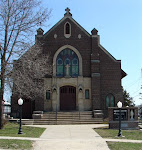Friday, July 29, 2011
Recommended Reading
In defense of St. Martha, On the sanctification of work
Posted by Father Ryan Erlenbush at The New Theological Movement
July 29th, Feast of St. Martha
And the Lord answering, said to her: Martha, Martha, thou art careful, and art troubled about many things: But one thing is necessary. Mary hath chosen the best part, which shall not be taken away from her. (Luke 10:41-42)
To be clear: We do not intend to "defend St. Martha" against the Lord, but rather to defend her from the popular (and sentimental) caricatures with which the modern world has obscured the true meaning of Christ's words. Today, it has become popular to speak of the importance of following Mary’s example in this dispute between the two sisters from Bethany. Certainly, Mary did chose the best part – which is the life of prayer. Still, we must recall that most of us (i.e. most of those reading this blog and also all the contributors) are called to the active life in the world – we are called to the life of work, which is symbolized by St. Martha.
Commenting on this passage, St. Augustine speaks well: “Martha was getting annoyed, Mary was feasting; the former coping with many things, the latter concentrating on one. Both occupations were good.” (Sermon, 103) Martha’s error was in criticizing the contemplative life of prayer (which Mary symbolized) – while she worked, Martha did well; when she stopped working and began to complain, she fell.
“Both occupations were good.” – In order that we might better understand how to follow what was good in Martha, fulfilling the duties of our state in life (whether in the workplace or in the home), we will turn to the spirituality of Opus Dei. This movement focuses on a spirituality for lay people in the world – in this respect St. Josemaría Escrivá greatly anticipated and promoted the theology of the Second Vatican Council which stressed the “universal call to holiness.”
Balancing Martha and Mary
Martha is a sign of the active life, the life in the world, the life concerned with many things – hers is the ordinary life of daily affairs, the life to which the majority of Christians are called.
Mary is a sign of the contemplative life, the life removed from the world, the life of the consecrated religious, the life of the evangelical counsels – hers is the extraordinary life, the most perfect life, the life to which only a very few Christians are called.
It will do NO GOOD to oppose these two lives. Moreover, exalting the one (i.e. consecrated life) does not entail lowering or despising the other (i.e. active life). Just as recognizing the practical necessity of work does not require that we neglect prayer. Indeed, we must find a harmony between Martha and Mary.
For the religious, consecrated to the life of prayer, we point out the celebrated words of St. Teresa of Avila: “God is found among the pots and pans!” – Even the monks and nuns must work, and they will find God in doing their work with true charity.
For persons living in the world – for diocesan priests and, especially, for lay persons – we emphasize that prayer is the most important “work” we accomplish in our day. A good day is a day in which we have prayed well, a day without prayer is a bad day indeed.
For the rest of the post got to: The New Theological Movement




